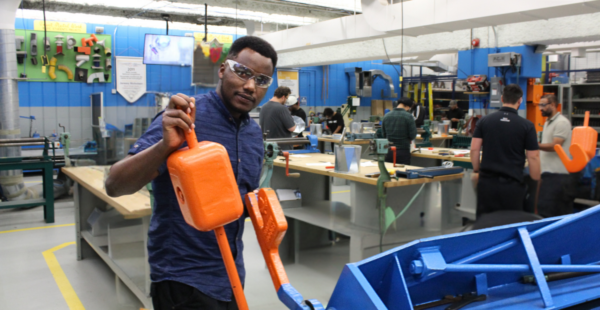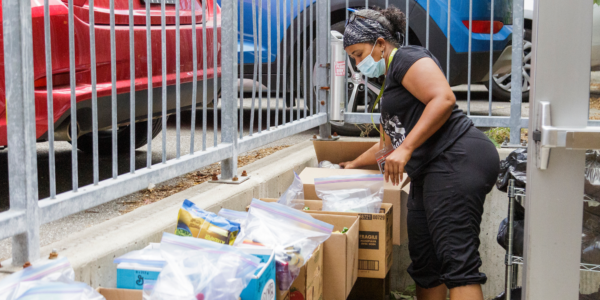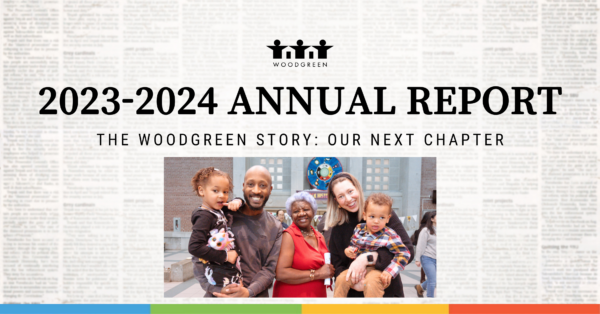Call to Action:
Affordable housing, homelessness supports, opportunities for employment and education, and access to community and senior care programs are key policy issues that all parties should make commitments to in this Ontario Election.
Every night in Canada approximately 35,000 people are homeless, and over 8,500 of these individuals are within the City of Toronto, the majority of come from marginalized populations. Statistics gathered in a 2020 report by Social Planning Toronto show that Toronto is the most unequal city in Canada in terms of prosperity, with a housing affordability crisis that segregates at-risk, low-income groups into impoverished neighborhoods scattered around the city.[i] In fact, Toronto has the highest rates of homelessness in the country.
Ontario needs more housing to meet the diverse needs of our many populations including those with disabilities, seniors and people with complex needs, individuals living in poverty and those who are homeless’. The lack of investment from the province over the years has led to the exacerbation of these vulnerable populations being under-served.
Programs like Ontario Works (OW) and the Ontario Disability Support Program (ODSP) are critical to assisting vulnerable Ontarians who have lost their jobs or are unable to work. The Ontario Government in 2019-2020 reported about one million Ontarians were receiving some form of monthly social assistance. According to the Ontario Ministry of Children, Community, and Social Services, 33% of the cases that exited Ontario Works between October and December 2018 had returned within one year (by December 2019)[ii]. Programs that will help Ontarians stay off social assistance and out of poverty are crucial. The cost of poverty in Ontario in 2019 was estimated at $27.1 - $33 billion per year.[iii] Ontario needs solutions and programs that will ensure people remain employed and do not return to social assistance.
Of the 35,000 Canadians who are homeless on any given night, over 9,555 are women and 6,545 are youth many of whom are fleeing the brutality of domestic violence.[iv] It is well documented that housing instability contributes to family stress, a multitude of health problems and is especially difficult for female-led single parent families. Poor housing quality and residential instability negatively impact the lives of children and adolescents, harming early development—constraining emotional and behavioural functioning and lowering cognitive skills. Further financial and social support is needed by from elected government for these women and families living in homelessness and in poverty, to ensure they have a pathway to education, employment and stable housing.
Ontario and Toronto are in desperate need of affordable housing solutions, homelessness supports and poverty reduction, employment initiatives, and education pathways. Ontario’s social assistance programs are vital to supporting Ontarians in need but cannot be the sole solution. Supportive programs in housing, employment, and youth, and wrap around support services for all vulnerable populations are needed to help build stronger, more sustainable communities.
As one of Toronto’s largest social service agencies, serving 37,000 people each year across 40 locations, offering over 75 programs and services tackling the social determinants that affect the health and well-being of individuals in our community, we are calling on the elected Ontario government to prioritize programs and services that transition vulnerable Ontarians out of poverty and homelessness, into education, employment and sustainable housing.
Through providing funding to non-profit housing providers, and by modelling and expanding WoodGreen’s programs and services, we can better to achieve provincial goals in supporting vulnerable populations.
Through further government collaboration with WoodGreen, we can provide more affordable housing; give youth access to impactful programs; and increase provide education pathways, workforce development and employment opportunities; and financial empowerment counselling. It will also allow us to deepen services and sustainable community care programs for seniors and those with complex health needs, to keep people living at home for as long as possible.
To better serve our vulnerable communities WoodGreen is recommending the elected government commit to act in the following four areas:
1. Develop policies and provide funding to create an upfront equity fund that will help non-profits increase access and develop affordable and supportive housing for Ontario’s most vulnerable populations.
2. Support, scale and expand programs that will eliminate barriers for vulnerable Ontarians providing them a pathway from social assistance, homelessness and poverty to education, employment and stable housing, such as expanding and supporting programs such as Homebound Bound, Workforce Development and Financial Empowerment programs.
3. Support, scale and expand the Rites of Passage youth program which provides personal development opportunities and educational achievement for Black youth, grounded in an Afrikan identity.
4. Build a Health Human Resources Plan that will stabilize the home and community care workforce and provide additional funding to expand community care services.
In Conclusion:
Our province needs policies and expansion of programs that target the social determinants of health, reduce social assistance and help vulnerable populations become educated, housed, employed and thriving in Ontario.
WoodGreen programs and services continue to target many aspects of the social determinants of health and help vulnerable populations get out of poverty and homelessness. Our agency continues to serve the Toronto community through our programs and services but with more engagement and collaboration from the elected provincial government, we know we can do even more.
For more information about WoodGreen’s Call to Action this election please contact Eric Mariglia, Director of Public Affairs – [email protected]
[i] Social Planning Toronto. Annual Report (2020–2021).
[ii] Government of Ontario. Ministry of Children, Community and Social Services. Building a Strong Foundation for Success: Reducing Poverty in Ontario (2020-2025).
[iii] Lee, C.R., & Briggs, A. (2019). The cost of poverty in Ontario: 10 Years later. Toronto, ON: Feed Ontario.
[iv] Stephen Gaetz, Jesse Donaldson, Tim Richter, & Tanya Gulliver (2013). The State of Homelessness in Canada 2013. Toronto: Canadian Homelessness Research Network Press.





